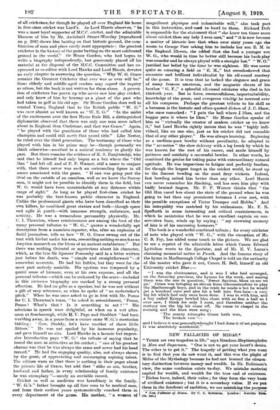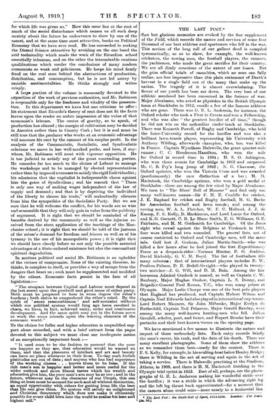NEW FALLACIES OF MIDAS.*
"THERE are two tragedies in life," says Mendoza-Mephistopheles in Man and Superman. "One is not to get your heart's desire. The other is to get it." The tragedy of getting what you want is to find that you de not want it, and this was the plight of Midas of the Mythology because he had not learned the elementary distinction between money and wealth. In Mr. Robinson's view, the same confusion exists to-day. We mistake material capital for wealth, and wealth for the true end of existence. "Riches have, indeed, their value ; for they form the very basis of civilized existence ; but it is. a secondary value. If we put. them lathe forefront of ambition, we are mistaking the purpose • Ss. Fallacies of, Midas. By C. E. ]toblason. Landow: ileatiley Bros. [Os. set.I
for which life was given us." How this error lies at, the root of muoh of the social disturbance which causes us all such deep anxiety about the future he endeavours to show by one of the sanest, and at the same time most attractive, hooks on Political Economy that we have ever read. He has succeeded in making the Dismal Science attractive by avoiding on the one hand the aridtechnicality which made the work of the Ricardian school essentially inhuman, and on the other the interminable cautious qualifications which render the conclusions of many modern
economists so weak and gelatinous. He keeps his mind firmly fixed on the real man behind the abstractions of prod-tuition,
distribution, and consumption, but he is not led astray by amiable sentimentalities. He thinks strongly and writes crisply.
A large portion of the volume is necessarily devoted to the exposition of the work of previous authorities, and Mr. Robinson is responsible only for the freshness and vitality of the presentation. In this department we have but one criticism to offer: his statement that Ricardo's theory of Dent does not fit the facts leaves upon the reader an unfair impression of the value of that economist's labouns. The centre of gravity, so to speak, of production has altered ; the margin of cultivation may be decided in America rather than in County Cork ; but it is and must be still true that the producer who works at an economic advantage will measure his rent by the amount of his surplus profit. In the analysis of the Communistic, Socialisitic, and Syndioalistio solutions we move in less well-marked paths, and here, if anywhere, Mr. Robinson will meet with vigorous opposition. He is too judicial to satisfy any of the great contending parties.
He concedes far too much to the claims of Labour to manage the workshops and to be managed by elected representatives rather than by impose4 overseers to satisfy the rigid individualist; his admission that the capitalist is indispensable closes against
him the gates of Syndicalism; and his remark that "There is only one way of making wages independent of the law of supply and demand ; and that is by depriving the individual
of the liberty to choose his trade," will undoubtedly alienate from him the sympathies of the Socialistic Party. But we are sure that he will welcome the conflict, for his words are so wise and seasonable that they will only gain in value from the publicity of argument. It is right that we should be reminded of the benefits derived by the community as well as the injuries re ceived from the stern application of the teachings of the Manchester school ; it is right that we should be told of the justness of the miner's demand for freedom and leisure as well as of his tyranny in the use of his monopolistic power ; it is right that we should have -clearly before us not only the possible material advantages of a State-ordered existence but also the concomitant spiritual degradation.
In matters political and social Mr. Robinson is an upholder of the virtues of compromise. None of the existing theories, he thinks, is complete in itself, or provides a way of escape from the dangers that beset us ; each must be supplemented and modified by the others. Economic facts persist in the facet of all legislation :—
" The compact between Capital and Labour must depend in the last resort upon the goodwill and good sense of either party. Both must be prepared to boar in some degree the other's burdens ; both strive to comprehend the other's mind. By the spirit of 'sweet reasonableness' and eelf-restraint without which our political system would long ego have resulted in chaos, we have, in fact, achieved unity, order and continuous development. And the same spirit may yet in the future serve to work the same miracle upon the warring elements of the economic world."
To the claims for fuller and higher education is unqualified support alone accorded, and with a brief extract from the pages devoted to this subject we must close our inadequate notice of an exceptionally important book :—
"It used once to be the fashion to pretend that the poor are happier as they are that education would be wasted on them, and that the pleasures of intellect and art and beauty con have no place whatever in their lives. To-day such foolish platitudes are out of date ; and anyone who has had experience of the working classes . . . knows them to be false. If the rich man's soia is happier and better and more useful for the wider outlook and snore liberal tastes which his wealth and education give him, the poor man's son may be so too ; and in the future, whatever may be the character of our Utopia, this one thing at least must be secured for each anct all without distinction, en equal opportunity with others for getting from life the beet that life can give them. No system will satisfy an enlightened and Christian democracy which does not make it ultimately possible for every child born into the world to realise his beat and highest self."



































 Previous page
Previous page